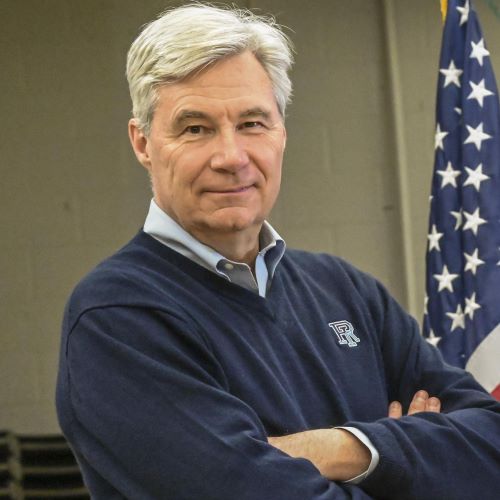Whitehouse Returns from Baku after Leading Senate Delegation to COP29

Washington, DC – U.S. Senator Sheldon Whitehouse (D-RI) led the Senate delegation to Baku, Azerbaijan last weekend for the U.N.’s 29th session of the Conference of the Parties (COP)—the largest and most important venue for world governments to gather to find international agreement on ways to solve the global climate crisis. U.S. Senator Ed Markey (D-MA) traveled alongside Whitehouse to COP29.
While at the Conference, Whitehouse participated in discussions on the future of U.S. climate policy, sea level rise and coastal resiliency, global methane enforcement, climate and trade policy, and corporate influence on climate policy. Whitehouse and Markey also hosted a press conference from the COP29 venue on Saturday. On Sunday, Senator Whitehouse participated in discussions on climate policy with foreign officials, environmental leaders, and business leaders.
While in Baku, Whitehouse and Markey met with the Office of the U.S. Special Presidential Envoy for Climate, the U.N. Assistant Secretary-General for Climate Action, and the Australian Minister for Climate Change and Energy. Whitehouse also met with the Executive Director of the United Nations Environment Program. The delegation returned to Washington on Monday.
Whitehouse released the following statement upon his return to Washington:
“It shames me to say that there will be no climate Normandy. America will not bring her strength to hasten the world’s victory. The next administration prefers the polluters, actually, and is well paid for it.
“But there is still hope.
“Big powerful American states like New York and California will move forward with increased vigor. California is the world’s fifth largest economy and New York the tenth, so their sovereign decisions matter, particularly when made together.
“Second, the European Union and other nations are moving forward with carbon border adjustment mechanisms or CBAMs, a powerful lever so long as not weakened. At all costs, the E.U. and likeminded nations should stand by their guns and give no inch of relief. Certainty and resolve on that point will actually improve America’s position. Our pathway to climate safety requires a border-adjustable price on carbon, and nations leading that should be congratulated.
“Third, clean energy is steadily cheaper than polluting energy, even with our massive freedom-to-pollute subsidies for fossil fuel. The market will ultimately have its way.
“Fourth, fiduciaries everywhere now must face the truth about climate risk, or face liability if they fail. Management’s fiduciary obligation to stockholders; investment advisors’ and realtors’ to their clients; all are implicated. The dangers long predicted by science are now within fiduciaries’ horizons, and greenwashing won’t do.
“To that point, the fossil fuel industry must cease obstruction of progress. Its liability exposure is already immense. I welcome our host’s statement that the polluters have a role in paying for the harms they caused. In the end, a pollute-for-free business model is a moral and economic wrong, and not sustainable: the carbon bubble will burst, the industry will face a calamitous collapse, and it would be prudent for it to prepare.
“Last, the leading edge of climate danger is economic danger. It’s already upon us in insurance markets; it’s certain both to worsen, and to cascade on into mortgage and property markets. The chief economist of mortgage giant Freddie Mac warned of a “coastal property values crash” akin to the 2008 recession; now wildfire and inland flood risk add to the danger. Some people have to touch the hot stove to learn.
“And skyrocketing insurance premiums are just one way climate change is making life more expensive for people. Higher food and beverage prices in supermarkets and higher costs due to supply chain snarls are just two of many ways in which climate chaos causes higher prices.
“A realistic prospect at Baku will be stopping methane leaks, now that we can spot them by satellite. In America, a regulatory team pursues ‘super-emitters’ and a prosecutor task force pursues unlawful leakers. We should forge in Baku international consensus on enforcement against methane leakers.
“Our safety measure is our oceans, which are heating up by the zettajoule monthly and acidifying. With corals, currents, and fisheries collapsing and sea levels rising, we’d be wise to add practical limits to fisheries, biomass loss, and plastic waste tonnage. The oceans have absorbed the initial shock of our pollution, but at what cost? We must also better understand tipping points, like the point at which the Greenland or West Antarctic ice sheets collapse, condemning coastal communities around the world to destruction.
“Real fossil fuel industry accountability, real methane leak enforcement, and renewed attention to oceans measures could actually make this COP productive.
“On another note, Azerbaijan must honor all of its international obligations and commitments—including its human rights commitments, both generally and with regard to neighbors like Armenia. Toward this end, I urge Azerbaijan to release those unjustly detained, including the many ethnically Armenian detainees.
“I understand that the parties have made significant progress towards finalizing a peace agreement. I am committed to supporting this process, but it’s important that any deal be predicated on releasing the ethnically Armenian detainees and honoring the right of return for ethnic Armenian refugees.
“I encourage all parties, including Azerbaijan, to continue to engaging productively in the peace process to ensure a just, durable and dignified peace in the region. Peace brings prosperity, stability, predictability, and security.”